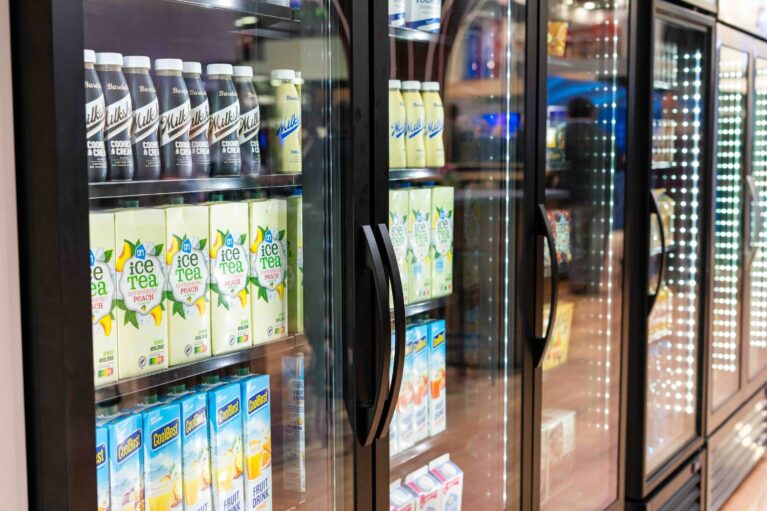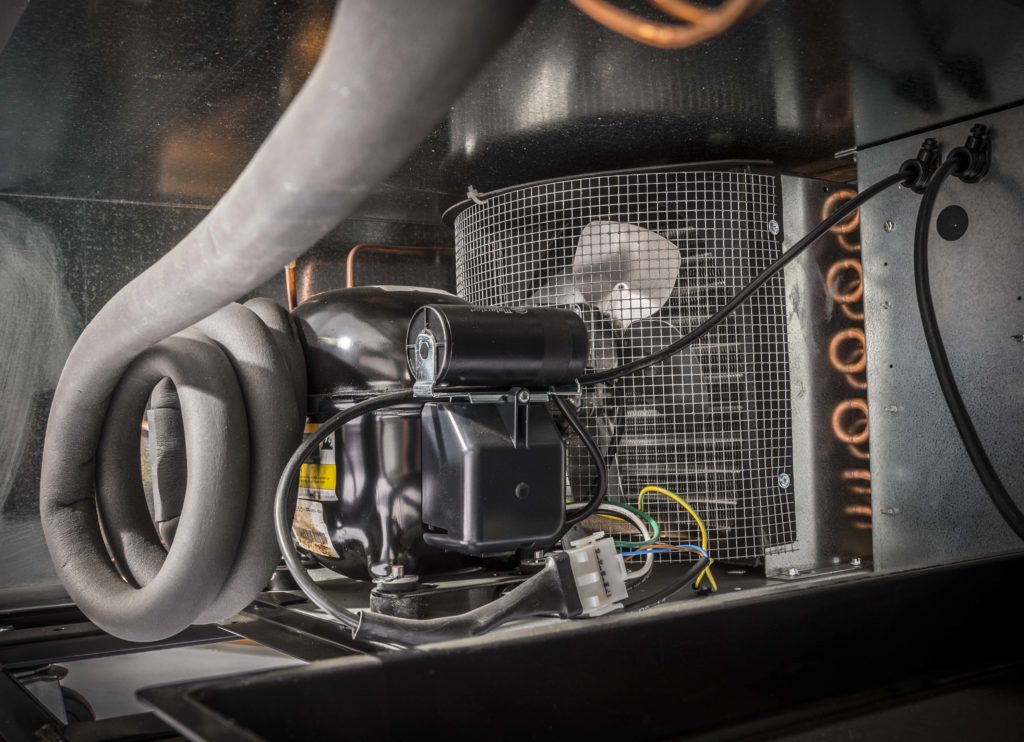5 Myths About Glass Door Refrigeration


To achieve these goals, cleaner and more efficient hydrocarbon (HC) refrigerants are being used to power commercial refrigeration systems in high-end restaurants, corporate dining facilities and even food trucks. In Europe over the past twenty years, some 4 million commercial refrigeration units have been produced and installed.
For decades, the most widely-used refrigerants used in commercial applications have been R134 for refrigerator applications or R404 for freezer systems. Both have very high Global Warming Potential (GWP) that is harmful to the atmosphere. By contrast, R290 is a highly-refined propane used as an alternative to these refrigerants.
Its capacity to absorb heat is nearly 90% higher than R134 or R404 which results in quicker temperature recovery and lower energy consumption. Also, its low ozone-depleting properties and extremely low GWP make R290 one of the most climate-friendly and cost-effective refrigerants on the market.

The drive to achieve sustainability goals by choosing energy-efficient and cost-effective products and services continues to be important for many businesses. And foodservice operations are no different.
To achieve these goals, cleaner and more efficient hydrocarbon (HC) refrigerants are being used to power commercial refrigeration systems in high-end restaurants, corporate dining facilities, retail stores and even food trucks.
In Europe over the past twenty years, some four million commercial refrigeration units have been produced and installed, and like all things, the use of these units has had an impact on the environment.
Professional refrigeration is now a highly regulated industry. Under the F-Gas legislation, governing bodies are enforcing the elimination of environmentally harmful refrigerant gases and establishing minimum energy performance standards.
For decades, the most widely used refrigerants in commercial applications have been R134a for refrigerator applications or R404 for freezer systems. However, both have very high Global Warming Potential (GWP) that is harmful to the atmosphere.
Due to this, the ban of new commercial refrigeration equipment operating on R404A came into effect in 2020, followed by the ban of R134a in 2022.
Hydrocarbon refrigerants have been selected as the environmentally friendly successor to the banned hydrofluorocarbon (HFC) refrigerants, because they are natural, non-toxic gasses that have no ozone depleting properties and low GWP.
R290 is a highly refined propane that’s now being used as an alternative to R134a and R404A. Its capacity to absorb heat is nearly 90% higher, which results in quicker temperature recovery and lower energy consumption.
Also, its low ozone-depleting properties and extremely low GWP make R290 hydrocarbon one of the most climate-friendly and cost-effective refrigerants on the market.
With many equipment manufacturers, like True, actively adopting technologies with lower GWP, it’s been revealed by JARN that an estimated 2.5 million R290 refrigerated display cases have been installed globally in supermarkets since 2019.
A big advantage of R290 refrigerants is their versatility, as they can be used to power various commercial refrigeration systems in restaurants, dining facilities, food trucks and retail outlets.
Just a small amount of R290 is required to charge the average upright or prep table refrigerator. From an economic standpoint, R290 has become cheaper and more widely available too.
It also has a proven track record of being easily recyclable, allowing it to be repurposed for other uses.
As a result, True Refrigeration believes that R290 is by far the best alternative for commercial refrigeration units.
However, R290 hydrocarbon refrigerant alone is not responsible for lowering energy costs in your business.
The advent of R290 has created the need for component manufacturers to develop more energy-efficient compressors, condensers and evaporators to be compatible for use with R290.
By using R290 in conjunction with these energy-efficient components, businesses can reduce their energy consumption, helping them to save money.
At True, we’ve created a calculator which gives an estimate of the lifetime electrical (kilowatt-hours) savings that could be achieved by choosing (one or more) energy efficient products from True compared to others on the market, along with relatable Greenhouse Gas equivalency metrics to assist with your carbon reduction goals.
For commercial refrigeration equipment, hydrocarbons have proved to be the next step, not only in terms of environmental responsibility, but also more energy efficient products.
Choosing hydrocarbon refrigerants is a future-proof investment for your commercial refrigeration needs.
We recommend that you ask your supplier about the refrigerant in your product to ensure you pick those with R290 hydrocarbon, as they will have the longest lifespan and best environmental credentials.
We’ve always taken the impact refrigeration has on the climate seriously, which is why we launched our Beyond Ready campaign.
Using Beyond Ready, we’re raising awareness of the environmental impact of commercial refrigeration and educating our industry on how we can respond to the issues facing us all.
At True, we strive to continually review and improve all aspects of our processes to minimise negative environmental impact, conserve energy and natural resources, and ultimately, deliver better commercial refrigeration products.
If you would like to find out more about True’s sustainable refrigeration solutions, contact us today.